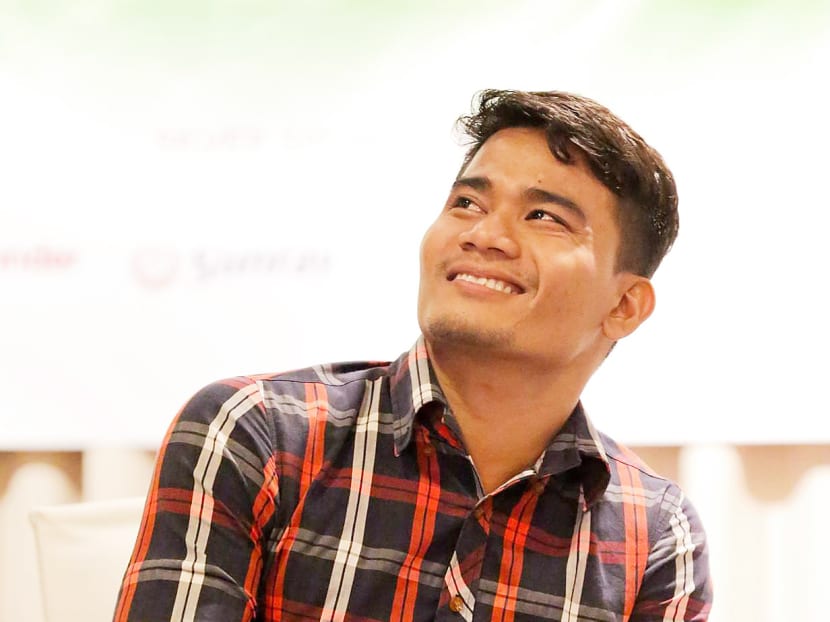NGOs’ efforts vital in fight against human trafficking
SINGAPORE — When he was struck down with polio at a young age, Chhap Longdy was deemed “suitable” to earn money for his family by becoming a beggar.

Cambodian trafficking survivor Chhap Longdy speaks to stakeholders at the Hagar Charity golf dinner on July 24. Photo: Kelda Chua
SINGAPORE — When he was struck down with polio at a young age, Chhap Longdy was deemed “suitable” to earn money for his family by becoming a beggar.
So at age eight, he was trafficked across the Cambodian border to Thailand, where he begged at markets for 13 to 15 hours daily, earning up to 500 baht (S$19.50) on a good day. Despite being arrested and deported, Mr Chhap, now 25, was to be trafficked across the border again and again four to five times over a span of six years.
It only stopped in 2003 after the authorities sent him to Hagar International, a non-governmental organisation with operations in countries such as Afghanistan, Cambodia, Singapore and Vietnam helping those whose lives have been torn apart by human rights abuse.
Mr Chhap shared his travails of being a human trafficking victim with TODAY at a charity event last Friday (July 24), which raised about S$100,000 for Hagar’s beneficiaries.
At the event, Hagar Singapore executive director Michael Chiam said it is important to raise awareness in Singapore about trafficking — in March, a new law against human trafficking involving sexual exploitation, forced labour and organ removal, came into effect here.
“Singaporeans, including me even two years ago, don’t think human trafficking can exist here ... after the work we do in Afghanistan, Cambodia, you realise that it is so easy to traffick someone,” said Mr Chiam. “Voluntary welfare organisations like us will work with each other, and work with taskforces to bring this issue to civil servants and the public sector.”
Last year, Hagar Singapore trained more than 3,000 police officers on human trafficking issues, such as how to identify trafficking victims. Over the next two years, it hopes to conduct follow-up training with these officers, as well as enforcement officers from the Ministry of Manpower and Singapore Customs, added Mr Chiam.
Member of Parliament for Holland-Bukit Timah GRC Christopher de Souza, who tabled the Prevention of Human Trafficking Bill in Parliament and also attended the charity event last Friday, agreed on the importance of the work of NGOs such as Hagar in preventing trafficking in Singapore.
He said: “I met with NGOs and VWOs for human trafficking rights throughout the process (of putting up the Bill). Some of their concerns were eventually put into the Bill, for example, (having) a dedicated shelter, (providing) counselling, food, and when the victims go to court, that they be accorded all the protection under the law.”
Mr Chhap said on top of being separated from his family when he was little, those who brokered his trafficking cheated his family, reneging on their promise to send 90 per cent of what he earned back to his parents and five siblings — they sent only 30 per cent of his earnings.
“When I lived with relatives in Thailand while begging, it was not good too because they beat me up and took my money,” he said.
Mr Chhap recounted an occasion where he did not go begging because he fell ill, and his brokers did not give him any food that day; only some medicine and water. “Sometimes I would hurt my knee begging also, because they will take away my pillow, saying that the tourists won’t give me money if I look too comfortable,” he added.
Mr Chhap was also shuffled between locations in Thailand so that he could not strike up friendships with the locals. When he was arrested, he would be beaten up and deported, but his complicated family circumstances demanded that he return to Thailand to beg.
Without the support he got at the Hagar shelter, Mr Chhap said he would never have turned his life around. “(When I first got to the shelter), I used bad words and hit younger kids. I got angry quickly, and didn’t listen much. The counsellors and caregiver at Hagar met me four or five times a week to talk to me, and they really helped me become a better person,” he said.
In his eight years at the shelter, he completed 12th grade and did well enough to earn a scholarship from the government to further his studies. He is now halfway through his psychology degree programme at the Royal University of Phnom Penh.
Mr Chhap also began volunteering at the Boy Recovery Centre in Hagar, counselling young boys aged between six and 16 years old who had been sexually abused, trafficked, or suffered domestic abuse, among other issues.
After getting his degree, Mr Chhap hopes to become a counsellor at Hagar, and subsequently work in the United Nations. “I want to help people who went through what I went through and have similar traumas, like Post-Traumatic Stress Syndrome, because not many people in Cambodia know about this type of trauma,” he said.








